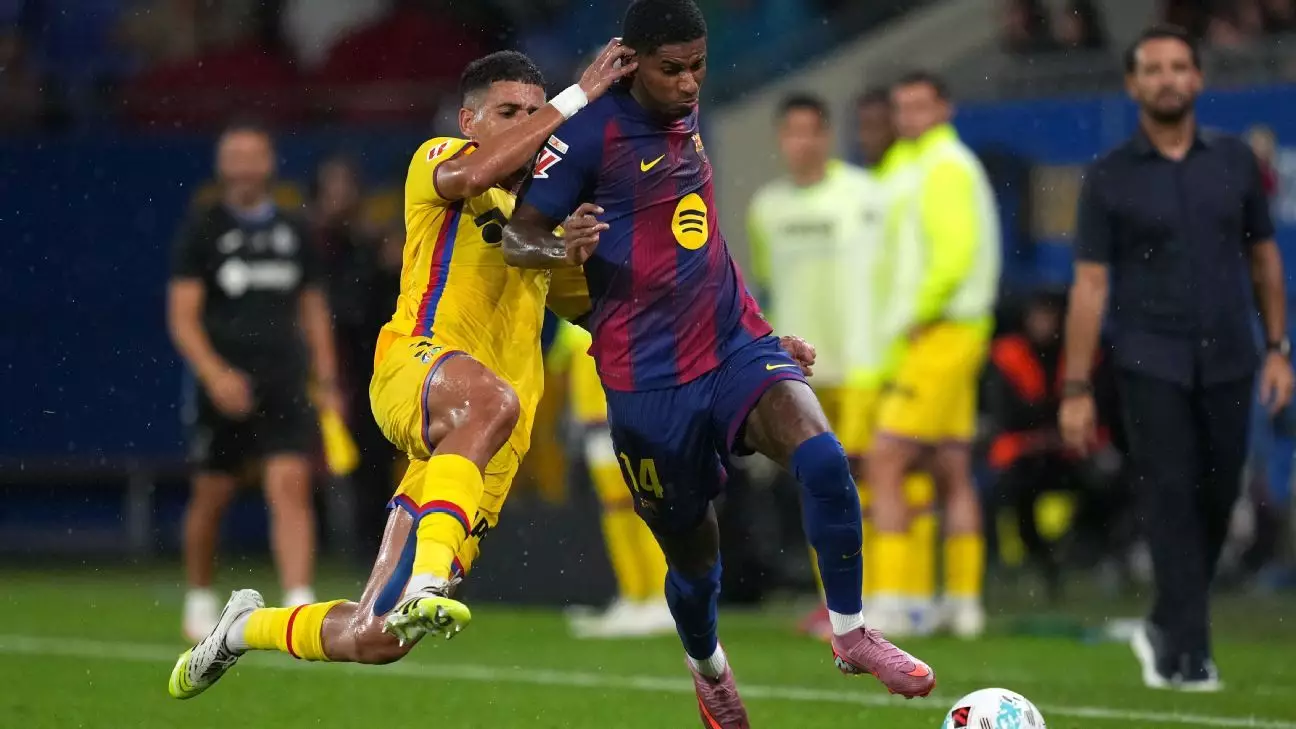In the world of professional football, expectations often soar beyond human capacity, fostering an environment where mistakes are magnified rather than understood. Marcus Rashford’s recent benching by Hansi Flick’s Barcelona illustrates this tension vividly. The narrative developed around Rashford’s marginal lateness—interpreted by many as a breach of discipline—rather than viewing it as a minor human misstep. This scenario exposes a broader issue: the obsession with flawlessness can obscure the recognition of genuine effort, resilience, and growth. No athlete is immune to slip-ups, yet the narrative often penalizes rather than perceives these incidents as opportunities for learning.
Rashford’s crucial contribution off the bench, setting up a goal, exemplifies how resilience and persistence are often more valuable than perfect attendance or punctuality. His ability to impact the game after adversity highlights that setbacks, if approached with the right mindset, can transform into stepping stones for greatness. The obsession with strict discipline can sometimes diminish the importance of mental toughness, which is arguably more impactful on the pitch than flawless punctuality.
Discipline or Rigid Control? The Cost of Zero Tolerance Policies
Flick’s strict stance on lateness reflects a broader philosophy of discipline, emphasizing order and professionalism. While discipline is essential, an overly rigid approach risks eroding player morale and fostering a culture of fear rather than one of growth. The stories of Raphinha, Jules Koundé, and Iñaki Peña, who faced similar consequences, reveal that such zero-tolerance policies may overlook the human side of athletes who, like all of us, can falter under pressure.
A balanced perspective recognizes that discipline should uphold standards without sacrificing empathy. Rabid enforcement often leads to resentment and diminishes player confidence, which can negatively influence performance. Rashford’s case illustrates that small lapses, when handled with understanding, can serve as teachable moments rather than career-threatening missteps. Coaches should appreciate the complexity of athletes’ lives, especially considering the intense demands of modern football.
The Unseen Power of Mental Resilience in High-Performance Environments
Despite the controversy surrounding Rashford’s absence from the starting lineup, his performance demonstrated an essential truth: resilience is an athlete’s most valuable asset. Coming on midway through the game and making an immediate impact shows tenacity and mental strength. It underscores that setbacks are inevitable, but the true measure of a player lies in their ability to rise above temporary setbacks and deliver under pressure.
Flick’s comments see the game as a success—three points secured, offensive control maintained—yet his handling of team discipline hints at a deeper understanding of athlete psychology. Success in sports is not merely about adherence to rules but about cultivating an environment where players feel respected and motivated to push beyond their limits. Rashford’s example exemplifies how resilience, combined with a supportive environment, can propel athletes to new heights and redefine what it means to be a professional.
Strategic Flexibility and the Illusion of Uniformity
Barcelona’s recent victory over Getafe showcased an impressive display of strategic flexibility. The team’s ability to control the game, capitalize on scoring opportunities, and adapt to challenges underlines the importance of tactical intelligence in modern football. Yet, it also raises questions about the rigid management of players. Manipulating squad rotation based on perceived discipline issues may overlook a more nuanced approach that balances trust and accountability.
The incident with Fermin López’s injury also highlights the unpredictability of football. Flexibility in strategy and a culture that prioritizes player health over rigid plans are crucial for sustained success. The team’s unbeaten run affirms that adaptability—both tactically and within team culture—is essential in a highly competitive environment. Rigid discipline policies may serve order temporarily, but long-term success requires understanding, trust, and strategic flexibility.
Leadership Beyond the Pitch: Cultivating a Culture of Growth
Ultimately, leadership in sports transcends tactical decisions; it embodies the ability to foster an environment that promotes growth, resilience, and mutual respect. Flick’s handling of Rashford’s situation, whether driven by strict discipline or strategic rotation, offers a lesson on leadership dynamics. Recognizing moments of human imperfection and responding with understanding rather than punishment can build a stronger, more resilient squad.
This approach aligns with the idea that greatness isn’t solely about perfect execution but about how players and coaches navigate adversity together. Rashford’s moment in the rain, coming on to influence the outcome, substantiates the claim that resilience and mental fortitude are what truly define a champion. Leaders who nurture such qualities inspire their teams to surpass obstacles and redefine their limits, paving the way for sustained excellence.


Leave a Reply